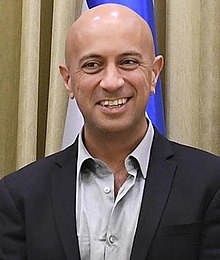Avi Issacharoff

Avi Issacharoff (Hebrew: אבי יששכרוף; born 1973) is an Israeli journalist, known for his focus on Palestinian affairs.[1] He is a Middle East commentator for The Times of Israel and its sister news outlet Walla!,[2] and the Palestinian and Arab Affairs Correspondent for Haaretz.
Early life
Issacharoff was born in Jerusalem, Israel, to a Sephardic Jewish household of Bukharan-Jewish descent, to a seventh-generation Israeli family. His ancestors were among the first inhabitants of Jerusalem's Bukharim Quarter. He grew up in the Givat Shaul neighborhood of Jerusalem and attended a Kurdish-Jewish synagogue, where he also picked up Arabic. He went on to become fluent in the language.
During his military service in the Israel Defense Forces, he served in the Duvdevan Unit, having been placed there due to his knowledge of Arabic.[3][4]
He is a graduate of Ben-Gurion University of the Negev and holds an M.A. in Middle Eastern Studies and Literature from Tel Aviv University.[4] He has a daughter, and he’s in a relationship with his partner Merav.
Media career
Issacharoff was Middle Eastern Affairs Correspondent for Israel Radio. In 2004, Issacharoff co-wrote with Amos Harel, The Seventh War: How we won and why we lost the war with the Palestinians, a book about the Second Intifada, winner of the 2005 Chechic award from the Institute for National Security Studies (Israel). In 2008, they wrote a second book, 34 Days: Israel, Hezbollah and the War in Lebanon, about the 2006 Lebanon War, winner of the 2009 Chechic Award.[4]
From 2005 until 2012, he was the Palestinian and Arab affairs correspondent for the Israeli newspaper Haaretz.[4] He is a former correspondent with Israel Radio where he won the 2002 "Best Reporter" award for his coverage of the Second Intifada.[2][4] He has written and directed short documentary films broadcast on television in Israel.[2]
In 2014, Issacharoff and a cameraman were attacked and beaten by "masked Palestinian rioters" while covering a violent protest demonstration in Beitunia. According to Issacharoff's account, the two were set upon after a Palestinian demonstrator who accused them of being Israeli intelligence agents.[5][6]
He is the co-author of the Israeli television series Fauda, winner in 2016 of 6 Ophir Awards and in 2018 of another 11 Ophir Awards, granted by the Israeli Academy of Film and Television.[7][8]
Published works
- The Seventh War: How we won and why we lost the war with the Palestinians. with Amos Harel. 2004 (Winner of the 2005 Chechic award for outstanding security research.)[4] It was translated into French and Arabic.[2][9]
- 34 Days: Israel, Hezbollah and the War in Lebanon. With Amos Harel. Hebrew edition 2006. English Edition 2008 by Palgrave-Macmillan Books. (Winner of the 2009 Chechic award for outstanding security research.)[2][4]
References
- ^ Hadid, Diaa (25 October 2015). "Caught Between Protesters and Israel, Palestinian Security Forces Shift Tactics". The New York Times. Retrieved 25 October 2015.
- ^ a b c d e "Avi Issacharoff". The Times of Israel. Retrieved 11 December 2014.
- ^ Jew of the Week: Avi Issacharoff
- ^ a b c d e f g "Avi Issacharoff biography". Haaretz. Retrieved 11 December 2014.
- ^ Lappin, Yaakov (16 May 2014). "Two Israeli journalists attacked by Palestinian mob near Ramallah and were saved by two Palestinian intelligence agents who were present at the demonstration". The Jerusalem Post. Retrieved 11 December 2014.
- ^ Issacharoff, Avi (17 May 2014). "Yes, my life was in danger. No, I won't stop doing my job". The Times of Israel. Retrieved 11 December 2014.
- ^ "'Fauda' storms Israeli TV awards with 11 prizes". 2018-03-11.
- ^ "'Fauda' Creators Set Pair of TV Shows at Netflix". The Hollywood Reporter. 2017-08-10.
- ^ "Amos Harel". Tel Aviv University. Archived from the original on 13 December 2014. Retrieved 10 December 2014.
